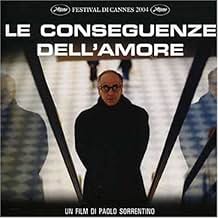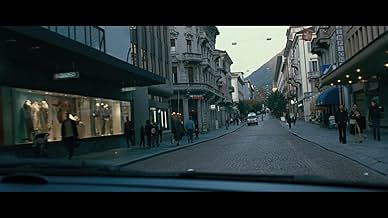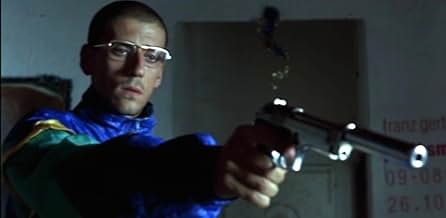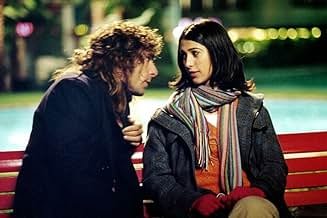NOTE IMDb
7,5/10
20 k
MA NOTE
La vie d'un introverti change complètement quand il se trouve attiré par une jeune serveuse.La vie d'un introverti change complètement quand il se trouve attiré par une jeune serveuse.La vie d'un introverti change complètement quand il se trouve attiré par une jeune serveuse.
- Réalisation
- Scénario
- Casting principal
- Récompenses
- 20 victoires et 21 nominations au total
Vincenzo Vitagliano
- Pippo D'Antò
- (as Enzo Vitagliano)
Avis à la une
I saw this the week it opened four years ago and I really did not know what to expect being unfamiliar with Sorrentino's work at the time. He has created a very intriguing and ultimately moving account of an odd character, one for whom the phrase 'life is for living' no longer applies. It outwitted me at every turn and I was constantly surprised by the story. I enjoyed the pacing very much and the way I was gradually given the pieces to work out what was happening. Tony Servillo is superb, as is Magnani. It opens with a brilliantly stylish wide shot and concludes with a very moving image that takes the movie into sublime territory. I thought long afterwards about the main character and the position he was in and his final fate and I didn't shake it for weeks. I recently bought the film and that final scene where he thinks about his friend gets me every time. I still have yet to talk to anyone who has seen this. It's a shame that it did not reach a wider audience as if this is the direction of Italian cinema it can only be a good thing.
The opening shot is hypnotic, drawing you in. Into a world of strangeness and solemnity. A deep, Italian baritone-voiced narrator making the invite ever more enticing. Then:
A middle-aged gentleman just sits in the hotel lounge, looking intelligent and distant, distinguished but also downright arrogant and rude. He never speaks to staff, or other guests, even, despite having been in residence for ten years.
He does something, without fail every Wednesday - and a couple more things the same day, once a year.
The sort of gentleman one could chance upon in any hotel, pretty well anywhere in the world. A poker-face of nothingness, smoking his life away, his concentration on his inner world only broken by the burned out cigarette stub. The excellent acting of Toni Servillo, coupled with the sublime direction of Paolo Sorrentino, employing a Kubrick style of slo-steadicam, with an ever sense of steady dread.
Always compelling rather than propelling, the story unfolds with Servillo's character, Titta, as he leads this strictly regimented life until confronted by the stunning Sofia, the barmaid. She looks at him straight in his eye and states that she's made his bed, served him this and that, had always been polite and courteous for the three years she's worked there. And he's never had the decency to utter a single word to her.
Instead of being nice back or even saying anything at all, we're aware that a flicker of something human has sparked within him. But, as the very title states, this lowering of his guard could very well be his downfall.
What does, however inflame this film and raises it even higher are the occasional flurries of activity. Titta hardly does anything more than almost nothing (driving one block, or looking around - not buying, though - a shopping mall) is accompanied by very loud punk rock music. This is unsettling - is this a dream he's having? Does he yearn for the fast life? Are the people he meets from a past, productive life? Do the characters he encounters then have any relevance to him - and to his situation now? The scenes look very real; the mood and ambiance are definitely not.
Moving on into the realms of more conventional crime drama, but still with a cool unease and an almost Memento meditative pace, the whole reveals lives and opportunities lost. Of redemptive longing and knowing one's own fate. This is an intelligent film that refuses to retread a potentially familiar path.
If in the U.K, BBC4 shows it again, wrap yourself inside it, be enveloped by it. You'll want to watch all of it, not that you know why but you'll be glad that you did. It's only 90mins. I've seen The Consequences... four times now, and I never tire of it. The ending will have you quietly shocked and amazed, too.
A middle-aged gentleman just sits in the hotel lounge, looking intelligent and distant, distinguished but also downright arrogant and rude. He never speaks to staff, or other guests, even, despite having been in residence for ten years.
He does something, without fail every Wednesday - and a couple more things the same day, once a year.
The sort of gentleman one could chance upon in any hotel, pretty well anywhere in the world. A poker-face of nothingness, smoking his life away, his concentration on his inner world only broken by the burned out cigarette stub. The excellent acting of Toni Servillo, coupled with the sublime direction of Paolo Sorrentino, employing a Kubrick style of slo-steadicam, with an ever sense of steady dread.
Always compelling rather than propelling, the story unfolds with Servillo's character, Titta, as he leads this strictly regimented life until confronted by the stunning Sofia, the barmaid. She looks at him straight in his eye and states that she's made his bed, served him this and that, had always been polite and courteous for the three years she's worked there. And he's never had the decency to utter a single word to her.
Instead of being nice back or even saying anything at all, we're aware that a flicker of something human has sparked within him. But, as the very title states, this lowering of his guard could very well be his downfall.
What does, however inflame this film and raises it even higher are the occasional flurries of activity. Titta hardly does anything more than almost nothing (driving one block, or looking around - not buying, though - a shopping mall) is accompanied by very loud punk rock music. This is unsettling - is this a dream he's having? Does he yearn for the fast life? Are the people he meets from a past, productive life? Do the characters he encounters then have any relevance to him - and to his situation now? The scenes look very real; the mood and ambiance are definitely not.
Moving on into the realms of more conventional crime drama, but still with a cool unease and an almost Memento meditative pace, the whole reveals lives and opportunities lost. Of redemptive longing and knowing one's own fate. This is an intelligent film that refuses to retread a potentially familiar path.
If in the U.K, BBC4 shows it again, wrap yourself inside it, be enveloped by it. You'll want to watch all of it, not that you know why but you'll be glad that you did. It's only 90mins. I've seen The Consequences... four times now, and I never tire of it. The ending will have you quietly shocked and amazed, too.
10dadie
There are movies that are just a different version of another one, not remakes, but just similar to others, it is not. Although it talks about Mafia it is watched in another way and often it seems just a secondary theme. I went to watch that movie for case (because the otherone's theatre was full) and I was satisfied at the end. It surprised me, because of its black irony or cynicism and there are more and more interesting items to analyze. It doesn't follow the classical ways of movies, it is just different and I think not to be the only one to like that. I am very happy also because it is Italian, and I was afraid that Italian directors and producers were not enough brave to change themes. In this movie you can watch new Italian style as well, but is not blocked into clichés. I hope to be understandable enough, I know it is difficult, I hope also that this movie can be exported out of our frontiers, it is a good product to export. I want to point out also the music, very good soundtrack, the movie needs it because of its long silent pause and they are covered perfectly by that music. Many compliments to the director, and thank you, cinema needs these movies.
One of the most significant quotes from the entire film is pronounced halfway through by the protagonist, the mafia middle-man Titta Di Girolamo, a physically non-descript, middle-aged man originally from Salerno in Southern Italy. When we're introduced to him at the start of the film, he's been living a non-life in an elegant but sterile hotel in the Italian-speaking Canton of Switzerland for the last ten years, conducting a business we are only gradually introduced to. While this pivotal yet apparently unremarkable scene takes place employees of the the Swiss bank who normally count Di Girolamo's cash tell him that 10,000 dollars are missing from his usual suitcase full of tightly stacked banknotes. At the news, he quietly but icily threatens his coaxing bank manager of wanting to close down his account. Meanwhile he tells us, the spectators, that when you bluff, you have to bluff right through to the end without fear of being caught out or appearing ridiculous. He says: you can't bluff for a while and then halfway through, tell the truth. Having eventually done this - bluffed only halfway through and told the truth, and having accepted the consequences of life and ultimately, love - is exactly the reason behind the beginning of Titta Di Girolamo's troubles.
This initially unsympathetic character, a scowling, taciturn, curt man on the verge of 50, a man who won't even reply in kind to chambermaids and waitresses who say hello and goodbye, becomes at one point someone the spectator cares deeply about. At one point in his non-life, Titta decides to feel concern about appearing "ridiculous". The first half of the film may be described as "slow" by some. It does indeed reveal Di Girolamo's days and nights in that hotel at an oddly disjoined, deliberate pace, revealing seemingly mundane and irrelevant details. However, scenes that may have seemed unnecessary reveal just how essential they are as this masterfully constructed and innovative film unfolds before your eyes. The existence of Titta Di Girolamo - the man with no imagination, identity or life, the unsympathetic character you unexpectedly end up loving and feeling for when you least thought you would - is also conveyed with elegantly edited sequences and very interesting use of music (one theme by the Scottish band Boards of Canada especially stood out).
Never was the contrast between the way Hollywood and Italy treat mobsters more at odds than since the release of films such as Le Conseguenze dell'Amore or L'Imbalsamatore. Another interesting element was the way in which the film made use of the protagonist's insomnia. Not unlike The Machinist (and in a far more explicit way, the Al Pacino film Insomnia), Le Conseguenze dell'Amore uses this condition to symbolise a deeper emotional malaise that's been rammed so deep into the obscurity of the unconscious, it's almost impossible to pin-point its cause (if indeed there is one).
The young and sympathetic hotel waitress Sofia (played by Olivia Magnani, grand-daughter of the legendary Anna) and the memory of Titta's best friend, a man whom he hasn't seen in 20 years, unexpectedly provide a tiny window onto life that Titta eventually (though tentatively at first) accepts to look through again. Though it's never explicitly spelt out, the spectator KNOWS that to a man like Titta, accepting The Consequences of Love will have unimaginable consequences. A film without a single scene of sex or violence, a film that unfolds in its own time and concedes nothing to the spectator's expectations, Le Conseguenze dell'Amore is a fine representative of that small, quiet, discreet Renaissance that has been taking place in Italian cinema since the decline of Cinecittà during the second half of the 70s. The world is waiting for Italy to produce more Il Postino-like fare, more La Vita è Bella-style films... neglecting to explore fine creations like Le Conseguenze dell'Amore, L'Imbalsamatore and others. Your loss, world.
This initially unsympathetic character, a scowling, taciturn, curt man on the verge of 50, a man who won't even reply in kind to chambermaids and waitresses who say hello and goodbye, becomes at one point someone the spectator cares deeply about. At one point in his non-life, Titta decides to feel concern about appearing "ridiculous". The first half of the film may be described as "slow" by some. It does indeed reveal Di Girolamo's days and nights in that hotel at an oddly disjoined, deliberate pace, revealing seemingly mundane and irrelevant details. However, scenes that may have seemed unnecessary reveal just how essential they are as this masterfully constructed and innovative film unfolds before your eyes. The existence of Titta Di Girolamo - the man with no imagination, identity or life, the unsympathetic character you unexpectedly end up loving and feeling for when you least thought you would - is also conveyed with elegantly edited sequences and very interesting use of music (one theme by the Scottish band Boards of Canada especially stood out).
Never was the contrast between the way Hollywood and Italy treat mobsters more at odds than since the release of films such as Le Conseguenze dell'Amore or L'Imbalsamatore. Another interesting element was the way in which the film made use of the protagonist's insomnia. Not unlike The Machinist (and in a far more explicit way, the Al Pacino film Insomnia), Le Conseguenze dell'Amore uses this condition to symbolise a deeper emotional malaise that's been rammed so deep into the obscurity of the unconscious, it's almost impossible to pin-point its cause (if indeed there is one).
The young and sympathetic hotel waitress Sofia (played by Olivia Magnani, grand-daughter of the legendary Anna) and the memory of Titta's best friend, a man whom he hasn't seen in 20 years, unexpectedly provide a tiny window onto life that Titta eventually (though tentatively at first) accepts to look through again. Though it's never explicitly spelt out, the spectator KNOWS that to a man like Titta, accepting The Consequences of Love will have unimaginable consequences. A film without a single scene of sex or violence, a film that unfolds in its own time and concedes nothing to the spectator's expectations, Le Conseguenze dell'Amore is a fine representative of that small, quiet, discreet Renaissance that has been taking place in Italian cinema since the decline of Cinecittà during the second half of the 70s. The world is waiting for Italy to produce more Il Postino-like fare, more La Vita è Bella-style films... neglecting to explore fine creations like Le Conseguenze dell'Amore, L'Imbalsamatore and others. Your loss, world.
Although I totally agree with the previous comment regarding the marvellous acting of Toni Servillo as Titta Di Girolamo, I would also like to add the beautiful filming and montage which turns this movie virtually into a painting. The young director Paolo Sorrentino had the courage to experiment with different types of camera techniques which reminded me of Darren Aronofsky' Requiem for a Dream. They both used the same MTV-style filming combined with modern (alternative/techno) music, making the film Le Consequenze dell'Amore - stand apart from the other crime/mafia movies in its genre. Even though the movie may start of very slow-paced almost "sec" compared to the faster Hollywood productions it should be enjoyed cause of its serenity, marvellous character portray and splendid ending. Definitely a must see for people who enjoy the European/Italian cinema. PS Toni keep on acting like this we need an encore.
Le saviez-vous
- AnecdotesThe book the girl at the table reads is Louis-Ferdinand Céline's "Voyage au bout de la Nuit" (1932).
- GaffesThe barrel of the tracksuit-clad assassin's fired gun, lying on the hotel mattress while the assassin is packing for departure, appears defective, i.e., rubbery, as the silencer barrel is angled downward. Moments later, after he picks up the gun and points it at the hotel room door, the barrel appears longer and straighter, as it was in the earlier scenes.
- Citations
Titta: In the world there's a certain kind of cult, with men and women of all social classes, of all ages and of all religions. It is the insomniacs cult. I'm part of it. For ten years. Those who don't belong to the cult sometimes tend to say: "If you can't sleep, you can read, watch TV, study or do something else". That kind of phrase is deeply annoying to the members of the cult. And the reason is simple. Cause the insomniac has only one obsession: to sleep.
Meilleurs choix
Connectez-vous pour évaluer et suivre la liste de favoris afin de recevoir des recommandations personnalisées
- How long is The Consequences of Love?Alimenté par Alexa
Détails
Box-office
- Budget
- 2 000 000 € (estimé)
- Montant brut mondial
- 2 556 056 $US
- Durée1 heure 40 minutes
- Couleur
- Mixage
- Rapport de forme
- 2.35 : 1
Contribuer à cette page
Suggérer une modification ou ajouter du contenu manquant

![Regarder Trailer [OV]](https://m.media-amazon.com/images/M/MV5BYTE4NzdmOGQtOTU4OC00YTJlLThiYzQtYjkwZWZlMDEzMzVjXkEyXkFqcGdeQXRyYW5zY29kZS13b3JrZmxvdw@@._V1_QL75_UX500_CR0)












